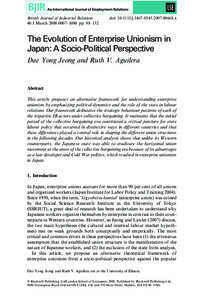The evolution of entreprise unionism in Japan: a socio-political perspective

Yong Jeong, Day ; Aguilera, Ruth V.
British Journal of Industrial Relations
2008
46
1
March
98-132
collective bargaining ; enterprise level ; history ; labour relations ; state intervention ; trade union
Labour relations
English
Bibliogr.
"This article proposes an alternative framework for understanding enterprise unionism by emphasizing political dynamics and the role of the state in labour relations. Our framework delineates the strategic behaviour patterns of each of the tripartite IR actors under collective bargaining. It maintains that the initial period of the collective bargaining era constituted a critical juncture for state labour policy that occurred in distinctive ways in different countries and that these differences played a central role in shaping the different union structures in the following decades. Our historical analysis shows that unlike its Western counterparts, the Japanese state was able to eradicate the horizontal union movement at the onset of the collective bargaining era because of its advantages as a late developer and Cold War politics, which resulted in enterprise unionism in Japan."
Digital
The ETUI is co-funded by the European Union. Views and opinions expressed are however those of the author(s) only and do not necessarily reflect those of the European Union or the ETUI.